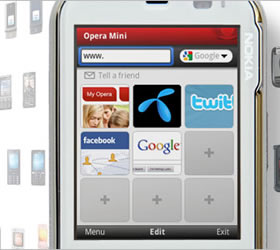 Not so very long ago, very few people could imagine ever wanting to browse the Web from the tiny, dark screen on their mobile phones. The browsing experience was awkward, unreliable and practically required a computer science degree to navigate. We’ve come a long way since then. The plethora of iPhones alone is one of the many indicators that the world is increasingly getting online.
Not so very long ago, very few people could imagine ever wanting to browse the Web from the tiny, dark screen on their mobile phones. The browsing experience was awkward, unreliable and practically required a computer science degree to navigate. We’ve come a long way since then. The plethora of iPhones alone is one of the many indicators that the world is increasingly getting online.
The small screen project
One year ago Telenor established the “Small Screen Project”, with the goal of overcoming barriers to Internet adoption in all of its markets. Growth in Telenor’s business units is very much driven by data and Internet, which makes the company’s focus on mobile Internet a natural part of the agenda.
“We saw that more and more people were ready for Internet on the small screen, with the iPhone really serving as a key driver. So we thought, why not bring the iPhone experience to the feature phones, as most of our customers are running these types of phones,” said Eskil Dahlen, VP and Head of Internet, Telenor Corporate Development.
The iPhone’s role in changing perceptions
Dahlen explained that Apple’s iPhone played a pivotal role in changing the public perception of small screen Web surfing, stimulating the industry, creating a demand and changing people’s expectations for what they wanted out of their phones.
“There was a big gap between the PC Internet experience and the smartphone Internet experience until the iPhone. Apple opened the door, and now everyone is trying to figure out ways to do what Apple is doing, only cheaper,” said Dahlen.
Bringing high quality Internet to the non-smartphoned population
Though the advent of the smartphone is what captures the headlines, most of the world is still using feature phones – the less smart, basic phones that are more affordable and available. To maximize the potential of feature phones, Telenor sought a way to bring a high quality Web experience to the non-smartphoned population.
“What we see is that the feature phones will be around for a long time to come, especially in the Asian markets. Up until now we haven’t really been stimulating the Web on these phones, which is why we are now cooperating with Opera Software to offer Opera Mini,” said Dahlen.
Cooperation with Opera Software
Telenor announced its agreement with Opera Software in late August 2010. Their agreement allows Telenor to distribute Opera Mini to customers in all regions it operates. Opera Mini is a mobile Web browser that can run on nearly any Java-based phone. This means that even users with more basic phones can now get a fast and affordable Web experience, without having to buy a new phone.
“The combination of what Apple has showed us and what Opera is doing, means more mobile Internet for more people,” said Dahlen. “Opera Mini uses compression technology to offload the data that is sent to the phone. This results in increased speed, reduced costs for our customers on pay-per-Mb plans and less stress on the network.”
Pilot study in Pakistan yields 50 per cent increase in usage
Prior to announcing its agreement with Opera, Telenor conducted a pilot study in Pakistan to measure the actual change in usage upon introduction to Opera Mini. During the initial four-week marketing campaign there was a steep increase in usage, as expected. However, once the campaign was over, mobile Internet usage stabilized with a significant increase, as compared to the reference group without Opera Mini.
Greatest potential in emerging markets
Telenor predicts that emerging markets represent the greatest potential for mobile Internet, as the number of feature phones is great and fixed line infrastructure is often lacking or even non-existent.
“Our goal is to get everyone on the Internet, no matter the type of phone they are using. For many of our markets, such as Pakistan, Bangladesh and India, the mobile phone is the only access point to the Web, so we want to make browsing the Web as easy, accessible and affordable as possible,” said Dahlen.
The future of the Small Screen Project
With fast and affordable Internet to more Telenor customers than ever before, what remains for Telenor’s “Small Screen Project” to explore? Dahlen predicts a mobile Internet future that is more locally tailored, meeting specific needs of people with a more relevant Internet experience.
Going local
“I foresee a more localized Internet. Up until now, customers have been very much entering a global arena for content and applications…but we see burgeoning trends in Russia, for example, where the users are increasingly getting local alternatives. We will likely happen in our Asian markets as well, with more and more Web-based content and services produced locally,” said Dahlen.
Internet means opportunity
“For us, the main driver is to make it possible for more of our customers to get online. The Internet is a source of opportunity and enables people to share and communicate in new ways. Our job is to make it easy.” -telenor











